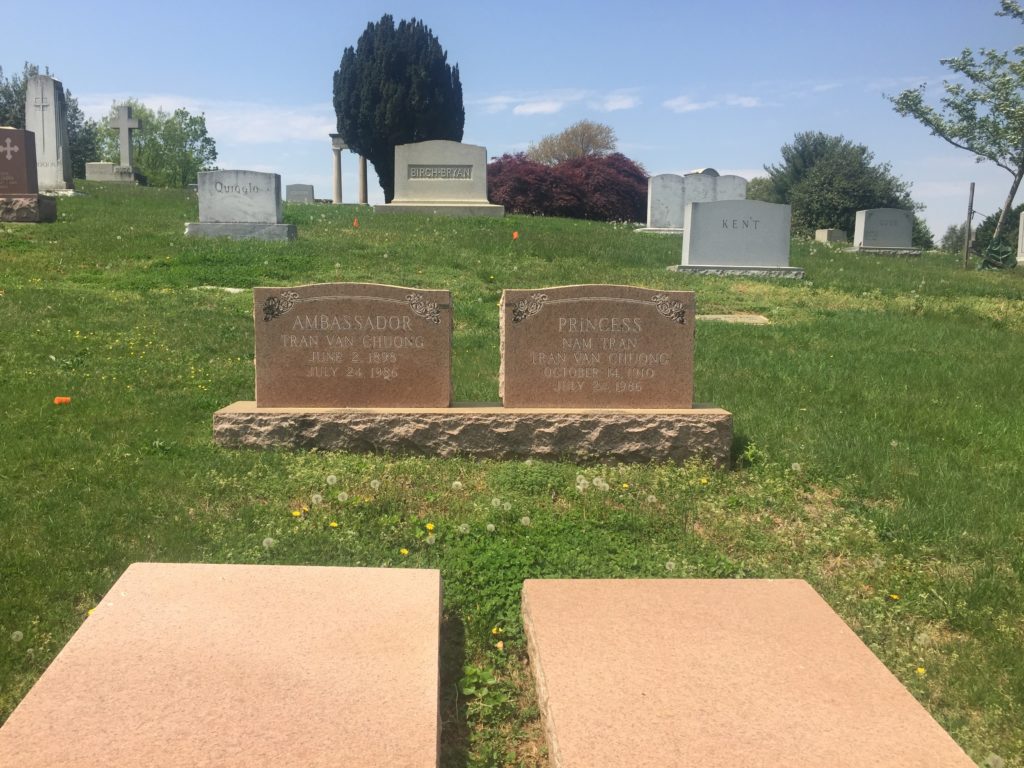Erik Visits an American Grave, Part 573
This is the grave of Tran Van Chuong and Princess Nam Tran Tran Van Chuong.

Tran Van Chuong was born in 1898 and Nam Tran in 1910. They were both members of the colonial Vietnamese elite. She was the granddaughter of Emperor Dong Khanh. He was a more recent arrival into this. His family was also politically connected. His father was the long-time governor of a province under the French colonialists. He was schooled in France and Algeria. He rose quickly, starting as a lawyer as a young man (he was the first Vietnamese person to receive a doctor of law degree in France) and then skyrocketing to the point that he became foreign secretary under Emperor Bao Dai during Japanese-occupied Vietnam in World War II and then was even vice-premier. Yeah, he was a pretty much a collaborator. He later claimed he thought that working with the Japanese was the best path forward for Vietnamese independence. Yeah, no, as Ho Chi Minh might argue. When the Viet Minh took control of the government in 1945, Chuong was arrested and his wife insisted on being arrested too so they wouldn’t be apart. They fled south and in 1947, moved to Paris. I don’t believe they ever again lived in Vietnam.
In 1954, the U.S. and France stole the southern half of Vietnam from the northern half and determined to make an anti-communist nation that would resist Ho Chi Minh’s government in Hanoi. That was only supposed to last two years, but then, since Ho was the George Washington of Vietnam and there was no way he was going to lose the nationwide plebicite to unite the nation, the U.S. cancelled the election and put its money behind Ngo Dinh Diem. The civil war that the U.S. called the Vietnam War would soon begin. Diem named Choung Ambassador to the United States. They partied it up big-time in Washington. Rich beyond belief, in no small part because the South Vietnamese government was very much about fleecing the nation for personal wealth, they threw epic and legendary parties for the Beltway elite.
Their daughter married Ngo Dinh Nhu, brother of South Vietnam’s president Ngo Dinh Diem in 1963. She became a widow when he was killed along with his inept and corrupt and brutal brother. Chuong himself resigned as ambassador that same year, at least in part in protest over the government’s repression of Buddhists. Their daughter, known as Madame Nhu, ended up living in Italy off the money the families had stolen from the Vietnamese people. In fact, her well-known brutality was denounced by her parents when he resigned. They actually said in their statement, “We do not wish to know her.” Diem was a bachelor and many believed Nhu was the real power player and that she was the power behind him. She then denounced her parents as responsible for Diem and Nhu’s deaths.
They wisely remained in Washington after his resignation. Chuong began traveling around the U.S. to give talks about the evils of the Diem regime and the deep problems in South Vietnam. When Madame Nhu toured the U.S., her parents famously refused to see her. All of this contributed to the instability of South Vietnam. It wasn’t the only reason that nation never had a chance of succeeding of course, but it definitely gave credence to the belief that it was a nation dominated by corrupt rich families dominated by infighting and with a total inability to govern. And certainly nothing about South Vietnam after Diem’s death really gave anyone reason to think otherwise.
They never did reconcile with Madame Nhu, though they did meet with her once in 1977. Their other daughter, who once slit her wrists and walked to Madame Nhu with them bleeding in response to Nhu evicting her lover (and future husband) from the country, taught at a college in North Carolina. However, their own son murdered them in 1986. He had been the family disappointment, a rich kid who lived off his family riches but had no talent or ambition (the AJ Soprano of the family basically). He was still in Vietnam when Diem was assassinated and was imprisoned for three years. In 1968, he joined his parents in Washington, but never found a place for himself in American life. In 1972, he actually wrote an op-ed in the Washington Post opposing U.S. troops in Vietnam. His parents were horrified and nearly disowned him and did exile him to Paris and wrote him out of their wills, though they still sent him money. By 1985 though, both were aging. They called him back from Paris to help take care of them. That didn’t go so well. He strangled them to death. After the murders, he was found mentally unfit for trial. They are buried at Rock Creek Cemetery, Washington, D.C.
If you would like this series to visit other foreign ambassadors who ended up staying in the U.S. so they wouldn’t get killed, you can donate to cover the required expenses here. Edmond Gênet, the French ambassador who stirred up so much trouble in the French Revolution that even Jefferson rebuked him, only to then be recalled by the Jacobins to what would have been the guillotine, is in East Greenbush, New York. In fact, this is a grave I am intending to see on my next adventure to collect graves for this series. Previous posts are archived here.


